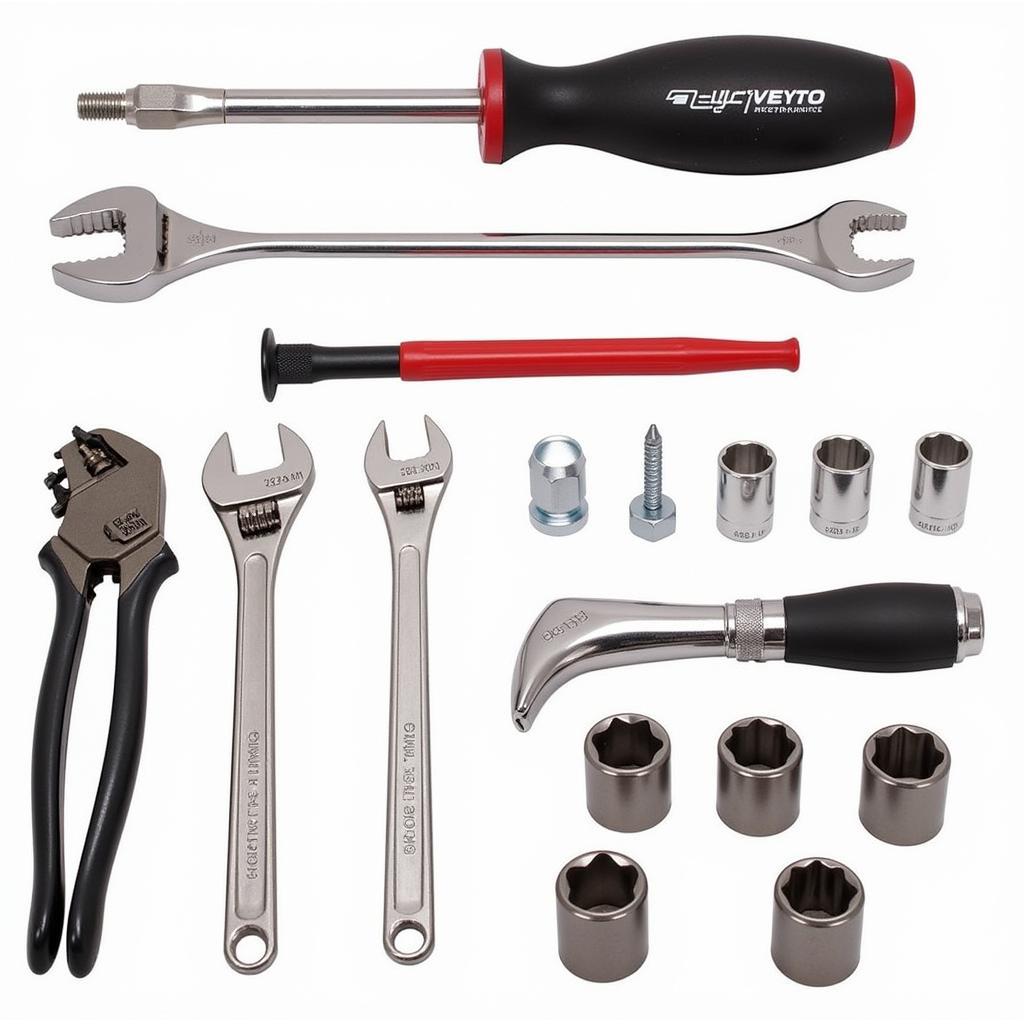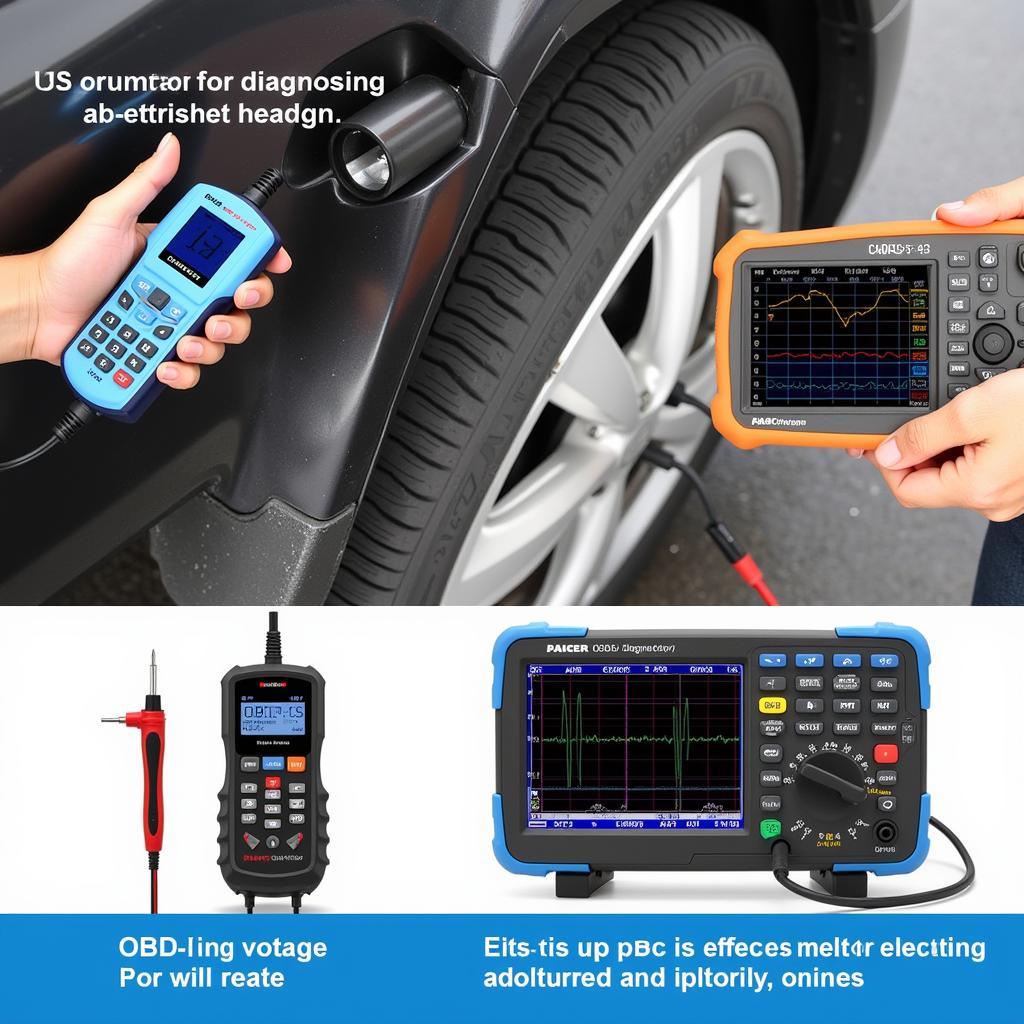Car mechanics rely on a diverse range of tools to diagnose, repair, and maintain vehicles. Understanding these “Tools Used By Car Mechanic” is crucial for both aspiring mechanics and car owners who want to be informed about the equipment used on their vehicles. This guide delves into the essential tools used by car mechanics, from basic hand tools to advanced diagnostic equipment.
 Basic Hand Tools for Car Mechanics
Basic Hand Tools for Car Mechanics
Hand Tools: The Foundation of Every Mechanic’s Toolkit
Every mechanic starts with a core set of hand tools. These are the workhorses of the trade, used for everything from simple oil changes to complex engine rebuilds. Essential hand tools include:
- Wrenches: Used for tightening and loosening nuts and bolts. Different types of wrenches exist, including combination wrenches, open-end wrenches, and adjustable wrenches.
- Screwdrivers: Essential for removing and installing screws. A variety of screwdriver heads are necessary, such as Phillips, flathead, and Torx.
- Pliers: Used for gripping, cutting, and bending materials. Common types include slip-joint pliers, needle-nose pliers, and locking pliers.
- Sockets: Used with ratchets to quickly tighten and loosen nuts and bolts in tight spaces.
what type of tools used for diesel or car mechanics
Power Tools: Enhancing Efficiency and Precision
Power tools significantly increase a mechanic’s efficiency and allow for more precise work. These tools are powered by electricity, air, or hydraulics. Some crucial power tools include:
- Impact Wrenches: Deliver high-torque bursts to loosen stubborn fasteners.
- Air Compressors and Air Tools: Provide compressed air to power a range of tools, such as impact wrenches, air ratchets, and air chisels.
- Drills: Used for drilling holes and driving screws.
- Grinders: Used for smoothing, cutting, and polishing metal.
Diagnostic Tools: Unveiling the Secrets of Modern Vehicles
Modern vehicles are complex machines controlled by sophisticated computer systems. Diagnostic tools are essential for understanding and resolving issues within these systems. Some vital diagnostic tools include:
- Code Readers: Retrieve diagnostic trouble codes (DTCs) from the vehicle’s onboard computer, indicating potential problems.
- Scan Tools: Advanced code readers that provide more detailed information about the vehicle’s systems and allow for bi-directional communication.
- Multimeters: Measure voltage, current, and resistance in electrical circuits.
- Oscilloscope: Displays the waveform of electrical signals, helping diagnose complex electrical problems.
 Diagnostic Tools for Car Mechanics
Diagnostic Tools for Car Mechanics
Specialized Tools: Addressing Specific Automotive Tasks
Beyond the general tools mentioned above, mechanics often use specialized tools for specific tasks. These include:
- Brake Bleeding Kit: Used to remove air from the brake lines, ensuring proper brake function.
- Fuel Pressure Tester: Measures the fuel pressure in the fuel system to diagnose fuel delivery problems.
- Compression Tester: Measures the compression in the engine cylinders to identify potential engine issues.
“A good mechanic understands the limitations of their tools and knows when to use specialized equipment for specific tasks,” says John Smith, a seasoned automotive technician with over 20 years of experience. He emphasizes that having the right tools is only half the battle; knowing how to use them effectively is equally crucial.
What type of tools are used for lifting a car?
Lifting a car safely and securely requires specialized tools such as floor jacks, jack stands, and car lifts. These tools ensure the vehicle is stable while mechanics work underneath.
How do mechanics choose the right tools?
Mechanics choose the right tools based on the specific task, the vehicle’s make and model, and their personal experience. Quality tools are an investment in a mechanic’s efficiency and the quality of their work.
“Investing in high-quality tools is crucial for any mechanic,” adds Jane Doe, an automotive instructor at a leading technical school. “It not only improves their work but also ensures their safety and the longevity of their career.”
In conclusion, “tools used by car mechanic” encompass a wide range of equipment, from basic hand tools to advanced diagnostic devices. Understanding these tools is vital for anyone involved in automotive repair and maintenance. Whether you’re a professional mechanic or a car enthusiast, having the right tools and knowing how to use them effectively is paramount.
FAQ:
- What are the most essential hand tools for a car mechanic?
- What are the different types of diagnostic tools used in car repair?
- How do power tools improve a mechanic’s efficiency?
- What are some specialized tools used for specific automotive tasks?
- How do mechanics choose the right tools for a particular job?
- Why are high-quality tools important for car mechanics?
- What are the safety precautions to consider when using car mechanic tools?
Need assistance? Contact us via WhatsApp: +1(641)206-8880, Email: [email protected] or visit us at 910 Cedar Lane, Chicago, IL 60605, USA. Our customer support team is available 24/7.

Leave a Reply